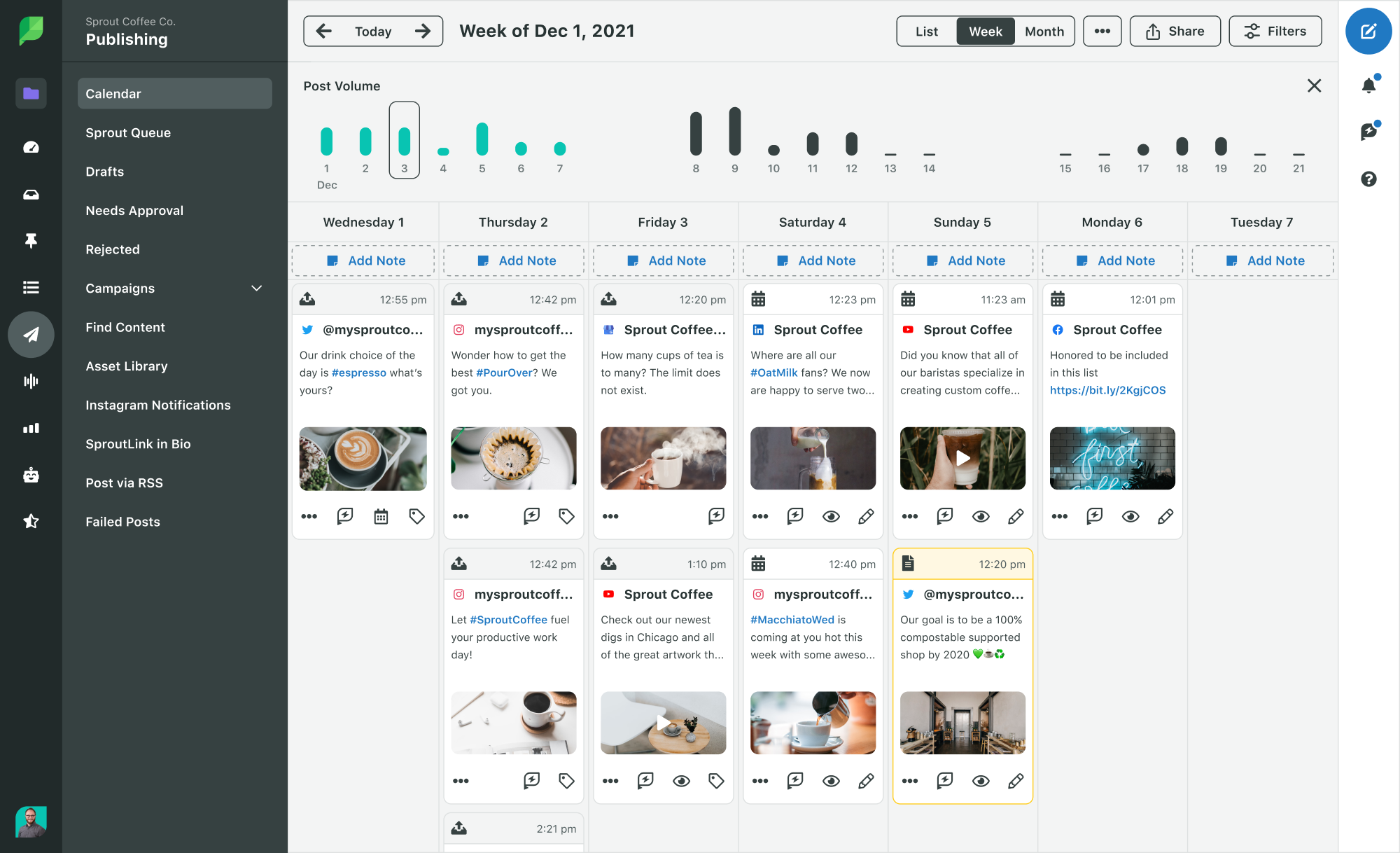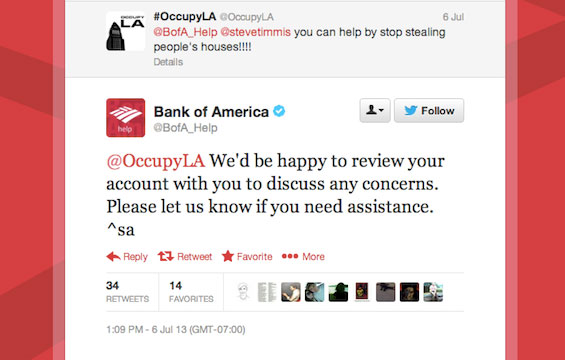
Social Media Marketing
15 Tips to Building a Better Social Media Presence
Struggling for followers? Stuck on what to do with your social accounts? We’ve all been there.
That’s why we’ve broken down the bite-sized tips any brand can follow to grow their social media presence right away.
Now, let’s dive in!
1. Set SMART Goals
Pop quiz: why are you on social media in the first place?
If your answer is a resounding “Uhh…” or “Because everyone else is on it,” you might have a problem.
The concept of SMART goals has been around for decades, but they are so important to your social media presence today.
In short, brands should set goals that are specific, measurable, achievable, relevant and time-bound.
An example of a good SMART goal for social media marketing would be something like “We’ll increase our Twitter response rate by 25% by the end of the first quarter.”
- Specific: “We’ve specifically identified the social channel (Twitter) and a metric (response rate).”
- Measurable: “The response rate can be measured from the Sprout Social dashboard.”
- Achievable: “We didn’t make an outlandish goal of say, a 100% increase in 10 days.”
- Relevant: “Our goal will have an impact on our overall social media presence, making it very relevant.”
- Time-bound: “The goal has to be met by the end of the first quarter.”
Assigning your social media efforts a concrete purpose helps you avoid the trap of posting aimlessly.
Add Even More Context to Your Goals with Advanced Listening By Sprout
Your SMART goals likely have a content element, but do you have the right tools to stand out in the conversation?
With Sprout’s Advanced Listening feature, connect your networks and set up topics to get a feel for what resonates most with social media audiences.
Learn more today by signing up for a free trial.
2. Identify Your Audience
After you’ve outlined your goals, you need to outline your target audience.
Pro-tip: “everyone” is not an audience.
Maybe it’s prospective customers. Perhaps it’s industry players and influencers. Either way, breaking down your audience will help you figure out the following:
- Which social media sites you’re active on
- Your posting schedule
- The type of content you publish
- Your brand’s voice
- The information in your profiles
Many brands spin their wheels because they don’t post content that speaks to a defined audience. Spend some time looking at your audience personas, understanding what their challenges are and what brands they already love via social. This sort of competitive analysis can help you understand how your own social media presence can stand out from the crowd.
3. Be Human
This is a big one.
One of the worst mistakes to make on social media is coming off as the faceless corporation with zero personality. In the modern age of transparency, people want to get to know your company on a more personal level.
Many brands today crack jokes and aren’t afraid to talk to their followers like they would their friends. Whereas brands were once lambasted for coming off like robots, a human social media presence has become an expectation among many followers.
Similarly, showing off the human side of your brand means showing off the faces behind your social feeds. Whether it’s office photos or snapshots of your team “in the wild,” getting personal with your followers can help you form a much-needed connection.
And hey, that leads us directly to our next point!
4. Seek Relationships, Not Just Followers
We can debate all day whether or not your follower count is a vanity metric.
That said, having 100 followers who regularly engage with you and your content are infinitely more valuable than 10,000 that ignore you.
It might be cliche to say, but don’t leave the “social” out of your social media presence. The beauty of social is that you can form relationships in an instant with followers from just about anywhere.
For example, Sprout Social’s own #SproutChat gives us the opportunity to regularly connect with our lovely followers who are likewise stoked to get in touch with us.
If you’re not exactly sure where to start when it comes to relationship-building, here are some quick ideas:
- Always @mention people you reference in your social media posts
- Answer questions people ask
- Reply when people @mention you or share your content
- Don’t just Retweet and Like other people’s content; reply with a comment to start a conversation
5. Create an Editorial Calendar
Spoiler alert: sticking to a content schedule isn’t just something “extra” that brands do.
If there’s a common thread between the biggest brands on social, it’s that they post on a consistent basis.
Chances are you’re juggling multiple social channels and are trying to make sure you tick a lot of boxes in terms of descriptions and when to post, right? Consider how a content calendar can make the process much easier by…
- Allowing you to fine-tune each of your posts for each platform without having to jump between sites.
- Timing your posts to maximize engagement, keeping you from having to constantly post in real-time.
- Avoid repeating the same content over and over again, ensuring each of your articles or pictures gets the most love possible.
In short, taking the time to make a schedule does double duty of keeping your social media presence organized while also maximizing your contents’ reach.

6. Automate the Right Way
Automation is all the rage in marketing right now, and for good reason.
However, you can’t expect to successfully put your social presence on autopilot and walk away.
For example, mass auto-replying has gone the way of the dinosaur as it typically comes across as insincere. This now-classic tweet from Bank of America is a good example of how to turn your social followers off via improper automation.

Fast-forward to present day and it’s clear that customer care is a piece of social media that should be personalized, not automated.

That said, automation in the form of scheduling or curating content is totally fair game. Just avoid it when you’re dealing with actual customers or followers’ questions.
This is why brands rely on social tools to help curate pieces of content already approved by marketing leaders. Bambu by Sprout Social, is in fact, just that piece of software needed to turn your employees into brand advocates. Tap into your workforce to help build your presence!

7. Focus on Helping Over Selling
Although social selling is indeed on the rise, rarely should your social media presence be about the “hard sell.”
Sure, if you’re in ecommerce it makes sense to push offers and deals to your followers. What’s more important, though, is answering the questions of followers whether through replies or content marketing.
If your followers ask a question, you should respond in a timely manner.
And if your followers seem to be buzzing about a particular problem, you should craft content that speaks directly to it.
By offering solutions to problems instead of just pitching your products all the time, you’re proving your company is an authority and potentially earning a lifelong customer.
8. Optimize Your Accounts for Engagement
First thing’s first: don’t let the word “optimization” freak you out.
Unlike SEO, social media optimization isn’t particularly technical. That said, profiles can be optimized through imagery, keywords and fully filling out your account information.
For example, brands can use their Instagram bio to link to promotions, advertise their hashtag and let their brand’s voice be heard.

Similarly, a well-crafted Twitter profile with the right @mentions and HD imagery can signal your authority, helping you attract more followers.

And as noted in our guide for conducting a Facebook audit, a fully optimized page with complete business info can actually help your page rank better in Google.

Some quick ways to optimize your social media presence across your various accounts include:
- Adding relevant keywords in your profile (hint: but not stuffing them)
- Sharing content related to your industry—including keywords and hashtags in your posts
- Connecting with popular accounts in your industry to additional exposure (hint: don’t be afraid to follow others)
9. When in Doubt, Get Visual
No matter where you’re posting, photo and video content are totally killing it right now.
Instagram’s image-based platform is exploding.
Facebook notes that Live videos get six times the engagement versus any other type of content.
And for those looking for more Twitter followers, graphics and videos get way more shares than text-based posts.
The good news is that getting visual doesn’t mean you need any sort of insane equipment or a full-blown production budget. Instead, consider imagery such as:
- Team photos or videos
- Photos of customers
- Photos of events
- Behind-the-scenes photos and videos
- Quote photos
- Infographics
10. Make Your Presence Known
If you’ve gone through the legwork of growing your social media presence, you need to let the world know.
From homepage feeds to icons on your site footer or email signature, anyone who comes in contact with your brand should only be a click away from becoming a long-term follower.
Facebook, Twitter, Pinterest and Instagram feeds can all be easily integrated into your site with little more than a copy-paste code. Check out how Keds features customers to create a highly authentic lookbook on their site:

Cross-promotion on your website and through other social channels is a proactive way to grow your following over time.
11. Stay Active
Inactive social feeds are a bad look for brands, plain and simple. Rather than let your Facebook or Instagram gather cobwebs, you need to “show up” day after day with fresh content.
Some quick tips to help you stay active include:
- Incorporating social scheduling and automation to save time and energy.
- Picking and prioritizing your social networks based on your audience location.
- Finding ways to repurpose content so you’d not always trying to reinvent the wheel.
Staying active on social doesn’t have to be a total time-suck. Through scheduling or simply blocking out 10-15 minute chunks throughout, you can post content and respond to customer concerns without wasting time. Also, you can try to base your activity around best times to post on social media to maximize engagement.

12. Piggyback on What’s Trending
Between breaking news, trending hashtags or whatever the latest meme might be, brands always have room to get topical with their content. This is a great opportunity not only to build off of buzz of an existing trend, but also show off your brand’s personality.
For example, understanding the in’s and out’s of hashtags can help you brainstorm time-sensitive topics you can piggyback on. Of course, tread lightly with anything overtly controversial that could isolate your audience.
13. Don’t Be Afraid to Pay
Like it or not, social media at large isn’t the totally “free” channel it once was. While there’s still plenty that can be done organically, Facebook’s updated algorithm and new business features being rolled out Instagram signal a clear need for businesses to experiment with ads.
It’s not just ads that deserve your attention, though. Looking at the recent boom of influencer marketing, paid relationships among social movers and shakers is becoming more and more common.
The good news is that both social ads and influencer marketing can have an insane ROI. Between laser-targeting on Facebook or tapping into hyper-engaged influencer audiences, a paid strategy certainly has its time and place depending on your business’ social goals.
14. Use Tools to Monitor Your Activity
When people complain about the lack of ROI they’re seeing from social, there’s a good chance they aren’t taking social seriously.
Just like we’re often knee-deep in Google Analytics data, marketers need to treat social with the same sort of scrutiny. There are tons of analytics tools out there to help you identify your top-performing content, performance trends and essential break down your social media presence by the numbers. These data points can help you treat social media less like a guessing game and more like a science.

15. Create Content People Actually Want to See
If you want to stand out on social media, you can’t just parrot the content everyone else is posting.
In short, you need to create.
Whether you’re trying to build yourself up as a thought leader or want to stand apart from your competitors, original content is exactly how you’re going to make it happen.
Perhaps it’s your original blog posts, research or infographics.
Maybe it’s an eye-popping snapshot you took during your last vacation.
Or hey, it might be an opinionated rant on the state of your industry.
Either way, you should strive to post content that forces your followers to stop in their tracks. There’s a lot of noise out here on social media: make it a goal to break through it.
What Does Your Business’ Social Media Presence Look Like?
Listen: there is no “secret” or turnkey solution for a better social media presence.
Instead, there are small tactics and strategies that can help you build toward social accounts that prime for engagement. The principles we’ve outlined are staples of brands killing it on social right now. If you can follow them yourself, you’re already way ahead of the game.
If you’re still trying to prioritize your next step to improving your social presence, try out our 30-day social media plan template.
Creating a 30-Day Social Media Plan
How to use the 30-day social media plan template
Your goal is to deliver high-quality, relevant content that will engage your audience, establish brand trust, and drive business—but how can you tailor your social content to break through all of the noise, provide value to your audience, and ultimately impact your bottom line?
This 30-Day Social Media Plan Template is designed to help you re-invent your social marketing strategy so that what you share aligns with the interests of your audiences and contributes to overall business value.
You will learn how to:
- Create an effective social strategy that aligns with audience interest
- Diversify your content and build a robust content calendar
- Determine business value driven by social
Use the social media plan template below to track your progress as you work through the plan. By completing just one task each day for the next 30 days, you can fully transform your social marketing strategy.

Using The Facebook Business Suite
Facebook Business Suite lets you manage all of your connected accounts across Facebook and Instagram in one place. It offers a variety of tools that makes it easier to manage your business presence for free. Facebook Business Suite can help you reach more people and stay up-to-date, while you manage your business presence in one place.
- View your business at a glance: From your home screen, you can see an overview of your Facebook Page and Instagram account. You’ll see updates, recent posts and ads, and insights. You can also create a post or promote your business from here.
- View Activity: You’ll see new notifications for your Facebook Page and Instagram account.
- Use Inbox: You can read new messages and comments from your Facebook Page, Messenger and Instagram accounts. You can also create Automated Responses to help save time when responding to questions people commonly ask.
- Create Posts and Stories: You can publish or schedule new posts and stories for your Facebook Page and Instagram account.
- Access Commerce Manager: If your business account has a Commerce Account, you’ll be able to access it from Meta Business Suite desktop. You can also create a new Commerce Account for your business if you don’t have one.
- Create Ads: You can create new ads and place them on Facebook and Instagram, boost your posts, and promote your Page.
- View Insights: You can see details about your business’s performance, such as trends, activity on the content you share and more information about your audience.
- Access More Tools: On Meta Business Suite desktop, you’ll find other Facebook tools and settings you might use to manage your business presence in the More Tools section. This includes other tools, such as Ads Manager, Business Settings and Page Settings. You can also go to your Facebook Page from here.
Listen and Learn
Additional Training Content
Finding Post Analytics
Following each post’s success is really helpful when it comes to creating future content. It’s good to know what is sells and what doesn’t.
Using the Facebooks Page Insights tool makes it easy to see each post’s stats so you can keep track of your success.

More Shares = Larger Reach



Clean Day Audience as of 11/2021


You can find audience stats in the Facebook Business Suite
Want to make your own Clean Day graphics?
Some of Jessies favorite FREE phone apps for building graphics and video from the comfort of the sofa!!
